BANK OF ALBANIA
PRESS RELEASE
Governor Sejko: Opening remarks at the 6th IMF & WB Constituency Meeting
Publication date: 16.02.2024
Your Excellency, Prime Minister,
Dear Ministers of Finance and fellow Governors,
Allow me, first of all, to welcome you to this annual meeting of our joint Constituency in the International Monetary Fund and the World Bank, which is taking place at the new premises of the Bank of Albania.
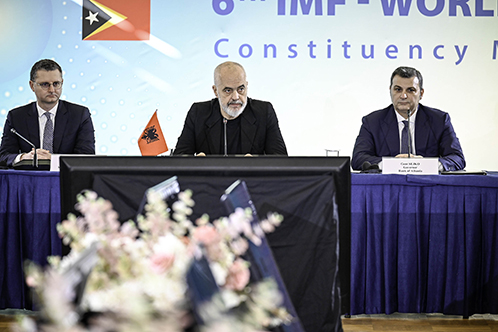
Also, let me highlight that this is a special pleasure for us, along with the Minister of Finance of Albania, as we have the opportunity to provide this welcome at the opening session of this event, for which we are the host country.
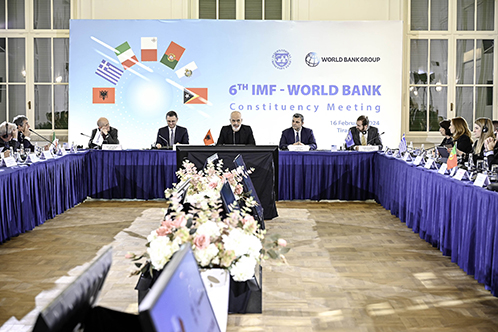
Dear participants,
The economic reality in recent years has been challenging. The 2020-2021 pandemic and the economic consequences of Russia's military aggression against Ukraine have been quite serious. However, I believe I am expressing a common opinion if I point out that the resilience of our economies and societies in the face of these challenges has been admirable. In particular, against a global context characterized by a rapid surge in prices, uncertainty and financing costs, we have managed to ensure positive growth rates in the overall economy, in employment and in wages. We have made progress in reducing inflation, and we have safeguarded the overall economic and financial stability of our economies.
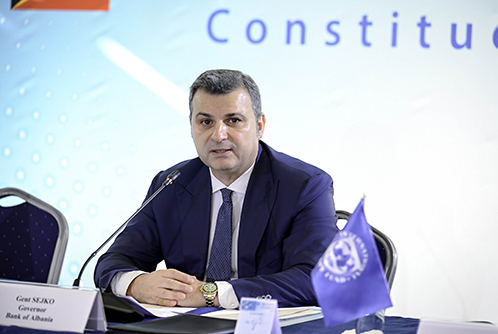
Albania is also part of this encouraging narrative. The year 2023 ended with economic growth at around 3.5%, the unemployment rate at historic lows, as well as foreign debt, public debt and non-performing loans ratios below pre-shock levels. In particular, inflation was halved over the past year, down to 4%, while indicators of the banking sector's soundness remain positive. A surprise in 2023 was an increase in the interest of foreigners in our country. Albania welcomed around 10 million visitors, climbing to third place in the world for the fastest growth in tourism and recording – for the first time in its history – a current account surplus. Also, the year 2023 is well on its way to being the year with the highest level of foreign direct investments, proving once again the attractiveness of Albania as an investment destination.
The Bank of Albania has made its contribution in this regard. We have addressed the increase in inflation in a timely manner, embarking on a gradual and prudential normalisation of the monetary policy stance. In complete coherence, supervision and careful regulation of the banking sector, continuous investment in advancement of the payment system, along with innovation and digitalization of financial services, have all contributed to development of the financial sector and strengthening the stability of our country.
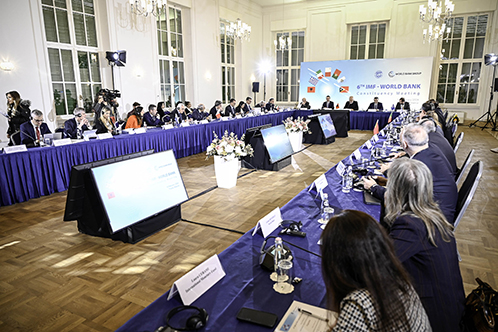
Albania's perspective remains positive. However, the experience of recent years has taught us that shocks and challenges, no matter how remote they may seem, will not be absent in the future. At this point, let me broaden the scope of the discussion somewhat. For a long time now, low growth of productivity, the effects of population ageing and labour force limitations have been turning into increasingly important factors affecting the development of the economies of our Constituency. In addition, geopolitical fragmentation and the effects of climate change are becoming present challenges.

But what do these challenges mean for us as policy makers? The answer is both straightforward and complex: we must ensure economic and financial stability, establish a more efficient, innovative and inclusive economy, as well as invest in the green and digital revolution. Allow me to be more specific.
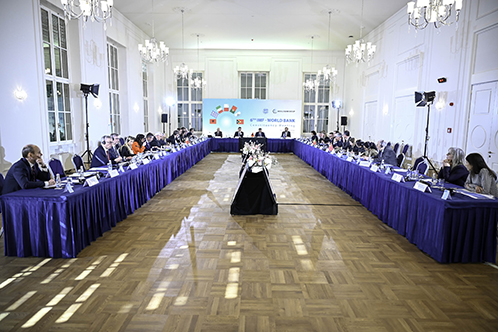
- First, as a central bank, we must take the fight against inflation to the end. Its downward trend is good news, but declining inflation is not an inflation on target. Therefore, central banks should continue to focus on taking the necessary measures to return inflation to the target, as a prerequisite for the sustainable growth of economies and the well-being of citizens.
- Second, we must insist on rebuilding fiscal spaces in timely manner, so that we are as prepared as possible to withstand future shocks.
- Third, financial policies should continue to have a twofold focus: on the one hand, inducing financial progress with a view to boosting efficiency and, on the other hand, addressing risks to financial stability early, through prudential regulation and supervision.
- Finally, structural policies should be increasingly oriented towards fostering sustainable growth. In the global and European contexts, in the face of a complex geopolitical reality, we must work to maintain - as far as possible - economic integration and free markets for products, labour and capital. This is a process that has brought remarkable progress to all involved actors. In parallel, the domestic structural reforms should focus on supporting innovation, training and continuous re-qualification of the labour force, as well as on stimulating both green transition and technological revolution. Meanwhile, developing countries like Albania should focus on meeting infrastructure investment gaps and establishing a more stimulating environment for bolstering domestic and foreign investments.
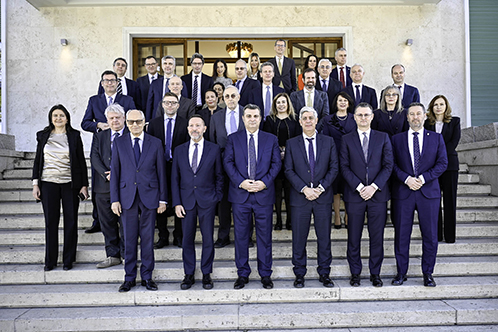
Dear Ministers of Finance and colleagues Governors,
Concluding these remarks, I would like to thank you once again for your participation and express my belief that this discussion forum will help us devise the most efficient and coordinated approach for the development of our countries.

 Linkedin
Linkedin
 Twitter
Twitter
 Youtube
Youtube
 Facebook
Facebook
 Flickr
Flickr
 RSS
RSS
 Subscribe
Subscribe
 Feedback
Feedback